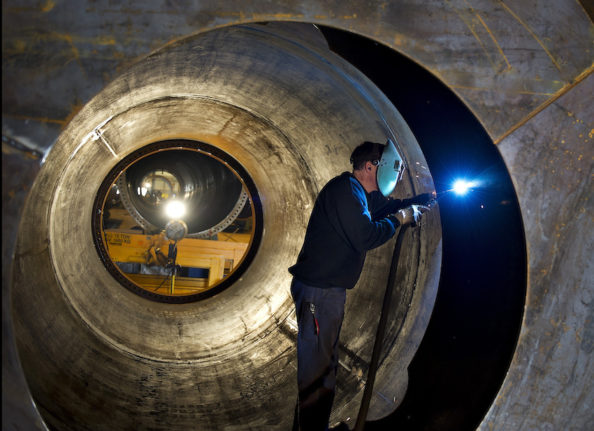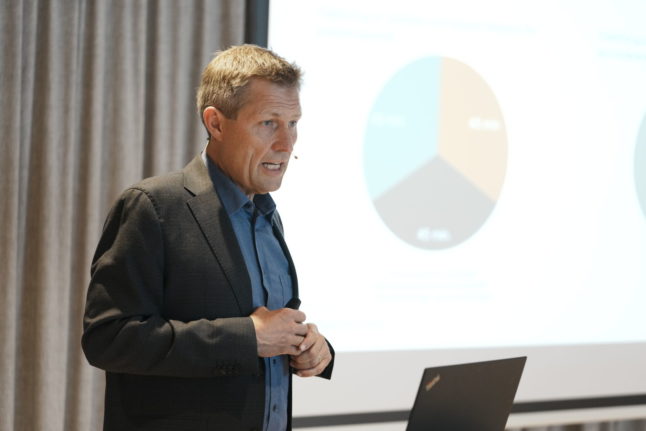Danish Agency for International Recruitment and Integration (SIRI) at the start of this year released a new “Positive List for People with a Higher Education”, which reduced the number of eligible job titles to 40 from the 46 which were on the list valid from July 1st until the end of 2022.
The number of job titles in the “Positive List for Skilled Work“, meanwhile, has been reduced from 46 to 36.
The new lists will apply to anyone seeking a work permit between January 1st this year and the end of June.
READ ALSO: How can you get a work permit in Denmark if you are not an EU national?
For people from countries outside the EU, the positive lists represent one of the best routes to a job in Denmark, with the first list outlining the qualified professions in demand in Denmark, and the second the skilled trades where there is a shortage of qualified labour.
If someone from outside the EU has been offered a job in Denmark in any of the professions on these lists, they can apply for a work permit through the scheme.
Siri updates the two lists twice a year on January 1st and July 1st on the basis of the Arbejdsmarkedsbalancen or “labour market balance”, prepared by the The Danish Agency for Labour Market and Recruitment, also biannually.
The Arbejdsmarkedsbalancen lists which job titles are currently experiencing severe labour shortages, labour shortages, which are employable, and which are less employable.
You can find the positive list from last July for people with higher education here, and the positive list from last July for people with skilled jobs here.
As of January 1st this year, the following job titles are on the positive list:
POSITIVE LIST FOR PEOPLE WITH HIGHER EDUCATION
Managers in the field of production and service:
- Head of product. Bachelor’s degree required.
Natural Science and Engineering
- Chemist: Master’s degree
- Biologist: Master’s degree
- Mechanical Engineer: Professional Bachelor’s degree or Master’s degree
- Civil Engineer: Professional Bachelor’s degree or Master’s degree
- Environmental Engineer: Professional Bachelor’s degree or Master’s degree
- Electronics Engineer: Professional Bachelor’s degree or Master’s degree
- Town Planner: Master’s degree
Healthcare
- Medical Doctor: Master’s degree + Danish authorization
- Hospital Doctor;´: Master’s degree + Danish authorization
- Nurse: Professional Bachelor’s degree + Danish authorization
- Veterinarian: Master’s degree + Danish authorization
- Dentist: Master’s degree + Danish authorization
- Physiotherapist: Professional Bachelor’s degree + Danish authorization
- Occupational therapist: Professional Bachelor’s degree + Danish authorization
Education
- Ph.D, Social Sciences: Master’s degree
- Assistant Professor at a University College: Master’s degree
- Subject Teacher at a Vocational Upper Secondary Education: Professional Bachelor’s degree + Danish official recognition
- Upper Secondary School Teacher, Natural Sciences and Sports: Master’s degree + Danish official recognition
- Independent School Teacher: Professional Bachelor’s degree
- Primary School Teacher: Professional Bachelor’s degree + Danish official recognition
- Child Care Worker/Support Worker: Professional Bachelor’s degree
- Social Education Worker: Professional Bachelor’s degree
- Special Education Teacher: Professional Bachelor’s degree + Danish official recognition
Economics, administration and sales
- Auditor: Master’s degree
- Accounting Controller: At least three years education at bachelor level
- Financial Analyst: At least three years education at bachelor level
IT and communications technology
- IT Architect: At least three years IT education at bachelor level
- IT Engineer: At least three years IT education at bachelor level
- IT Project Leader: At least three years education at university or business school level
- IT Consultant: At least three years IT education at bachelor level
- Programmer and System Developer: At least three years IT education at bachelor level
- System Administrator: At least three years IT education at bachelor level
Law, social science and culture
- Legal Officer: Master’s degree
- Psychologist: Master’s degree + Danish official recognition
- Social Worker: Professional Bachelor’s degree
- Priest: Master’s degree
- Organist, cantor: At least three years education at bachelor level
Technician work in science, engineering, shipping and aviation
- Architectural Technology and Construction Manager: Professional Bachelor’s degree
Technicians and assistants in healthcare
- Dental hygienist: Professional Bachelor’s degree + Danish authorisation
POSITIVE LIST FOR SKILLED WORK
Science and Engineering Associate Professionals
- Laboratory Assistant
- Geotechnician
- Plumber
- Machine Constructor
- Foreman
Business and administration associate professionals
- Import and Export Employee
- Sales and Account Manager
- Sales Consultant
- Shipping Agent
- Property Manager
- Logistic Employee, sales and purchasing
- Legal Secretary
- Medical Secretary
Legal, social, cultural and related associate professions
- Parish Clerk
- Head Chef
General and Secretary Clerks
- Lead Office Clerk
- Office Assistant
Numerical and material recording clerks
- Bookkeeper
- Bookkeeping and Accounting Clerk
- Payroll Bookkeeper
Personal services workers
- Chef
Personal care workers
- Social and Health Care Assistant: Danish authorisation
Market-oriented skilled agricultural workers
- Landscape Gardener
Building and related trades (excluding electricians)
- Bricklayer
- Carpenter
- Building Painter and Decorator
Metal, machinery and related trades workers
- Welder
- Blacksmith
- Sheet Metal Worker
- Industrial Technician
- CNC-operator
- Mechanic, passenger cars and vans
- Crane Mechanic, agriculture and industrial machines
- Agricultural Machinery Mechanic
Electrical and electronic trade workers
- Electrician
Food processing, wood working, garment making and other craft-related trade workers
- Cabinetmaker



 Please whitelist us to continue reading.
Please whitelist us to continue reading.
Member comments